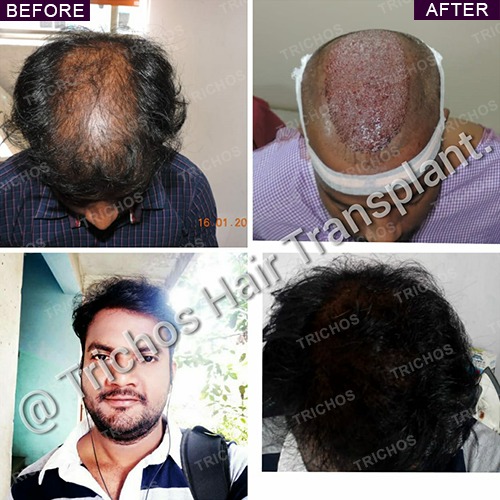Hair Transplant in Diabetics
If you are a diabetic with baldness, should you get scared of a hair transplant? Is there nothing diabetics can’t do to control their hair loss? These are common questions that bog down diabetics facing different hair loss or baldness issues in general.
Though diabetes is a common lifestyle disease and can be easily managed with the right medications and necessary lifestyle and dietary changes, things may turn worse if it is not properly managed.
In this educational video, renowned trichologist, dermatologist and one of the top hair transplant surgeons in Hyderabad Dr John Watts discuss the options available to diabetic patients experiencing either hair loss or baldness issues.
“Diabetes can bring out several changes to our body. If uncontrolled, it can affect kidneys, eyes, nerves and blood vessels. Hair loss is also a minor side-effect,” explains Dr John Watts.
He points out that the reasons why one may acquire diabetes are several ranging from heredity factors, sedentary lifestyle, high carbohydrate food intake and the risk factors one is endowed with.
Diabetes Types:
Broadly, diabetes is classified into two types: Type 1 and Type 2. In Type 1 diabetes, the ability of the pancreas to produce insulin is affected as the immune system attacks its production. Whereas Type 2 Diabetes, the body develops insulin resistance.
Medical Management:
In his video presentation, Dr John Watts urges the viewers not to skip the medications prescribed by their respective diabetologists and endocrinologists for blood sugar control ever.
“The diabetics with hair loss and baldness issues must religiously follow all the instructions given by their physicians and worry less about their hair loss while focussing more on their health. Once every 2-3 months, they must also review their medication dosage,” he says.
Diabetes Impact on Hair:
Besides kidneys, eyes and nerves, diabetes (when uncontrolled) is known to damage the microvascular system – the smallest blood vessels that carry blood and nutrients to different parts of the body including hair follicles.
“Hair fall is often a natural side effect if it does not get enough nutrients through blood supply through the microvascular system for diabetics. However, there are options they can explore to control the problem,” informs Dr John Watts.
However, while using any of the undermentioned options, the medications being prescribed for the diabetics by their physicians CAN’T be stopped!
Hair Loss in Diabetics: Options
The commonly available options for hair loss available for diabetics include the following:
Minoxidil Treatment
PRP Therapy
Stem Cell Therapy
Dermaroller for hair growth
Dermapen Treatment
In particular, Dr John Watts – who has performed over 1800+ hair and beard hair transplant surgeries successfully – urges diabetic hair loss patients to be very cautious in the use of Dermaroller for hair growth & Dermapen treatment as unscientific use can bring adverse consequences.
“Diabetic patients are very sensitive when it comes to injuries. The wound healing may take time. This makes it dangerous for them to sustain injuries. Hence, they must not experiment,” he warns, while urging them to use the two options under the expert medical supervision of a trichologist or dermatologist only.
Baldness Treatment in Diabetics: Options
For baldness, Dr John Watts lists out two options for diabetes – wig or hair transplant surgery.
Either of them could be a suitable option depending upon the nature of baldness and the condition of the diabetic patient.
“Wig is advisable if the patient’s condition is not suitable for undergoing hair transplant surgery to cover the bald spots,” he explains.
However, there is a minor disadvantage that diabetics opting for hair transplant surgeries must keep in mind.
“They cannot expect on par hair transplant results with non-diabetics who undertake the same procedure. This needs to be kept in mind as their results may drop by 15-20% as a result of their diabetic condition,” he informs.
If you are a diabetic looking for hair loss or baldness solutions, please feel free to consult our experts at Trichos for more information.
Book an appointment for expert guidance


About
Causes
Alopecia
Restoration
Procedures
Locations
Disclaimer: While hair transplants are generally safe and effective, as with any medical procedure, there can be minimal and temporary side effects based on specific or underlying medical condition of the individual patient. Please consult in person with our qualified medical team at Trichos for a thorough assessment of your specific condition and individualized guidance on the potential risks and benefits associated with our hair restoration treatments.
Learn more about Medical Consent for Surgeries.



